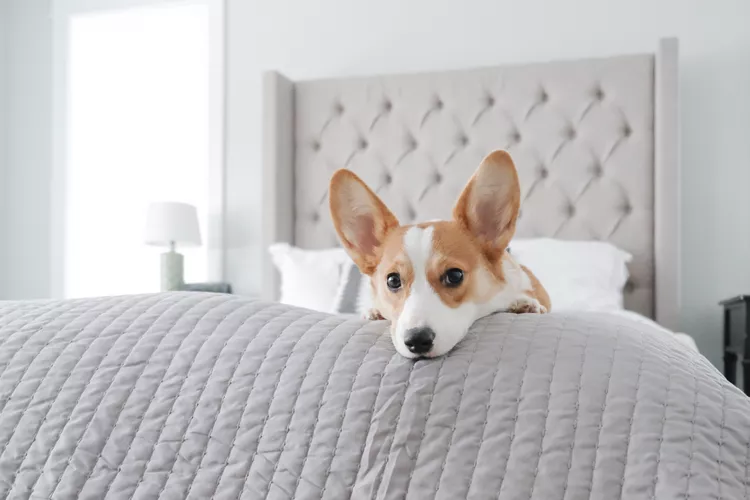Why Does My Dog Pee on My Bed?

If your dog is peeing on your bed, you are likely beyond frustrated. Dog urine can ruin your bed. Plus, if you don't use a urine detector to find and clean the stain, the scent may attract your dog, and they might just pee again.
Your bed is appealing, soft, absorbent, and smells like you. Naturally, your dog wants to spend a lot of time there. Many people think that dogs pee on their owners' beds as an act of dominance or rebellion. However, the reasons may be more complicated than this.
Why does your dog pee on your bed? What can be done about it? Is it happening all of a sudden? The first step to solving this problematic behavior is to determine the cause for it. You may need to visit your veterinarian for help with inappropriate urination, but you also have some at-home options.
Why Dogs Pee on the Bed
There are several possible reasons your dog is peeing on your bed. It's important to begin by ruling out medical causes before you try to address potential behavioral problems.
Urinary Tract or Kidney Problems
Urinary tract infections commonly cause dogs to have urinary accidents. Your vet may need a urine sample to run a urinalysis. If your dog does have a UTI, antibiotics will be needed to clear it up. Other issues with the urinary tract can make it difficult for dogs to control bladder activity.
Other possible urinary problems seen in dogs include cystitis (inflammation of the bladder), crystals in the urine, bladder stones, structural abnormalities, kidney disease, and even tumors. Most urinary issues can be treated with medications, supplements, or diet changes. In more extreme cases, issues like bladder stones may require surgery.
Certain diseases like diabetes and Cushing's disease can affect the urinary tract, as well.
Incontinence
Dogs with urinary incontinence will leak urine involuntarily. This may occur only while the dog is asleep, but some dogs with incontinence will dribble urine while they are awake as well. Incontinence is relatively common in senior dogs, but certain conditions can cause incontinence in young dogs, as well. Hormone-responsive urinary incontinence is not uncommon in female dogs and may even affect males, though more rarely. Fortunately, medications are available to help.
Housetraining Issues
Is your dog fully housetrained? Some dogs will appear to be mostly housetrained but then will find a favorite place to relieve themselves indoors. This may be your bed! If you think housetraining is the issue, then it's time to work more with your dog on training.
Excitement, Fear, Stress, or Anxiety
Excitement urination is common in younger dogs. They tend to dribble some urine when they are overly excited or are put in a submissive position. Many dogs grow out of this behavior, but some will need training if it continues into adulthood.
Fear, stress, and anxiety can all cause a dog to urinate inappropriately. Changes to your dog's environment may explain sudden stress. However, underlying medical conditions also cause stress to your dog. Rule out health problems first, then try to reduce your dog's stress as much as possible.
Territorial Marking
Some dogs are more territorial than others. Many like to mark their territory with urine. However, when they do this to your bed, it becomes a major problem for you. Territorial marking can be minimized through training and behavior modification.
How to Stop Your Dog From Peeing on the Bed
If your dog has been peeing on your bed, you should first contact your veterinarian. Your vet will likely want to perform a physical examination and collect a urine sample for a urinalysis. Additional lab tests and even radiographs (X-rays) may be needed in some cases. Your veterinarian will discuss a treatment plan with you based on the findings.
If your vet rules out all potential medical reasons for your dog's inappropriate urination, then it's time to work on correcting the behavior.
Check Your Dog's Environment
First, assess your dog's environment. Have there been any changes that could be causing stress? Events like moving, the birth of a baby, the addition or subtraction of a pet or family member, and even your own life stress can cause your dog to become stressed, fearful, or anxious. An anxious or fearful dog is unable to learn new things, so you will need to reduce stress before you work on training. Your vet may be able to help with anti-anxiety medications or supplements.
Build Good Habits
When training your dog to stop peeing on your bed, you must first restrict access to your bed when you are not around. Keep the bedroom door closed while you are gone. If needed, keep your dog in a crate when you're gone. When you are home, be sure to take your dog outside for pee breaks frequently. Only allow your dog to get on the bed when you are on the bed.
If your dog begins to urinate somewhere else that is inappropriate, then the crate is the best place for him when you are gone. Take your dog out to pee as soon as you get home. Then, take him out again every time he eats, drinks, or wakes up. Reward him for urinating outdoors, but do not punish him for urination inappropriately. If you catch your dog in the act of peeing in the bed or somewhere else inappropriate, interrupt him with "uh oh" or "no," then immediately bring him outside to finish.
Seek Professional Help
Training to correct inappropriate urination can take time and may become frustrating. Seek help from a dog trainer or animal behaviorist if you are not seeing good results.